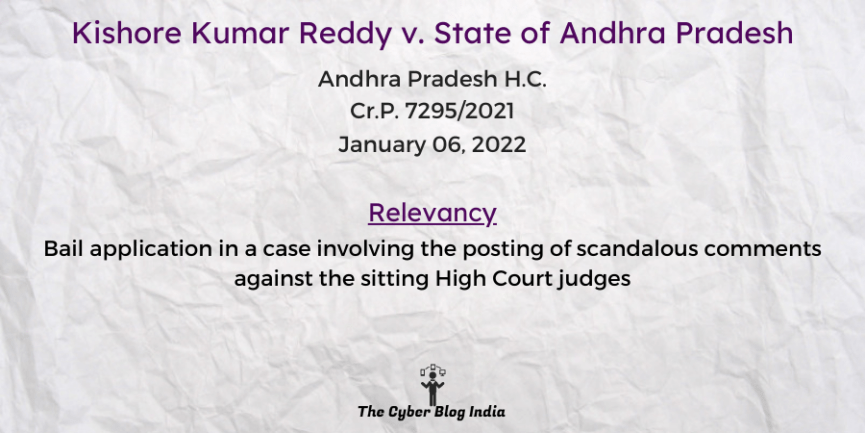Kishore Kumar Reddy v. State of Andhra Pradesh

Kishore Kumar Reddy v. State of Andhra Pradesh
In the High Court of Andhra Pradesh
Cr.P. 7295/2021
Before Justice D. Ramesh
Decided on January 6, 2022
Relevancy of the case: Bail application in a case involving the posting of scandalous comments against the sitting High Court judges
Statutes and Provisions Involved
- The Information Technology Act, 2000 (Section 67)
- The Indian Penal Code, 1860 (Section 153A, 504, 505(2), 506)
- The Code of Criminal Procedure, 1973 (Section 437, 439)
Relevant Facts of the Case
- The then Registrar General of the High Court of Andhra Pradesh lodged a complaint for posting comments against the High Court Judges. These acts scandalised and, as a result, lowered their image.
- A High Court order directed the filing of an FIR under Sections 505(2) and 153(2) of the Indian Penal Code, 1860. The Central Bureau of Investigation (CBI) later took over the case for investigation.
- The CID police issued notices calling the petitioner to appear in connection with the said crime, and the petitioner appeared.
- The police seized a Samsung phone from the petitioner. They retrieved posts on Facebook. Subsequently, the police arrested the petitioner, and the petitioner filed the bail application.
Prominent Arguments by the Advocates
- The petitioner’s counsel argued that this court had dismissed the bail application earlier on merits. During the pendency of the said petition, the respondents filed a charge sheet, but they did not bring it to the notice of this court. The fact came to the petitioner’s notice only after disposal of the first bail application.
- The petitioner’s counsel also submitted that the court had dismissed the earlier bail application because they had not completed the investigation. As of today, the police have completed the investigation and filed a chargesheet. Therefore, the court should grant bail to the petitioner.
- The respondent’s counsel submitted that the petition is not maintainable because they had considered the previous bail applications filed and dismissed them. The petitioner cannot file a second bail application within 15 days without assailing the orders in appellate form. Moreover, there has been no change in circumstances.
Opinion of the Bench
- In Virupakshappa Gouda v. State of Karnataka, it is clear that filing a charge sheet does not lead to altered circumstances. Also, the petitioner is not entitled to default bail as the present applications are not filed under Section 167(2) of the Code of Criminal Procedure, 1973.
- Moreover, the court mentioned that the rule of the criminal justice system is bail, not jail.
- In the same FIR, the court had granted bail to other accused persons.
Final Decision
- The court allowed the petition and granted bail to the petitioner.
Julia Anna Joseph, an undergraduate student at Christ (Deemed to be University), prepared this case summary during her internship with The Cyber Blog India in January/February 2022.
